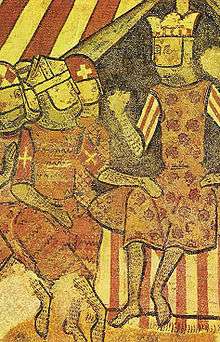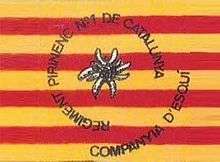Military history of Catalonia
The military history of Catalonia began in the thirteenth century, with the first exploits of the armies under the orders of Catalan rulers and lasting until today, where Catalan soldiers are integrated into international forces.

Origins
The origins of military force in Catalonia date back to the thirteenth century, with the Sagramental, the brotherhood among several peoples to guarantee their own security, made by oath, and, therefore, called this way. Though they were institutionalised during the reign of James I, they had already been legislated in writing during the 11th century. In Catalonia, the usage Princeps namque established the requirement that every man participate in the national defense in the event of external threat.
The history of the Mediterranean has often tasted Catalan weapons, from Murcia to Athens and Neopatria (Great Catalan Company), but also to old Catalonia, before and after the Nueva Planta decrees (1716).
The Catalans have been organized spontaneously militarily in many different ways, from the Sagramental, the Crusades of the Almogavars to the maulets, the submissive ones, or the maquis. Until the Nueva Planta decrees, in Catalan homes there were always weapons and ammunition to defend themselves, either from the Saracens, the pirates or the French.
It is not therefore until after the defeat of the War of the Spanish Succession that the new Bourbon authorities limited and controlled the right to bear arms, and under the pretext of pacifying the country, it hides the desire to prevent citizens from rising in Weapons against it, as had happened many times.[1]
In addition, the Catalan constitutions, abolished in fact by the Decree, forced the Crown to negotiate the popular support, represented by the arm seal (an institution that convened the Provincial Council of the General in an extraordinary way in cases of emergency or urgency) of the catalan courts, support that they often granted in exchange for privileges, which limited the royal authority. This balance of powers disappears after the defeat, and humiliation becomes apparent in many ways, such as the demolition of La Ribera quarter, where there was more resistance, the construction of the fortress of the Ciutadella in the same place, the imposition of the Cadastre, or the closure of all Catalan universities.
For this reason, when they saw the difference of the concept of royal authority in Castile, the Catalans rose up with Archduke Charles of Austria, handed out posters of propaganda and negotiated with England.
War of the Spanish Succession
Spanish Civil War

- People's Army of Catalonia
- Regiment Pirinenc Núm. 1
References
- ↑ Vegeu Guerra de Successió Espanyola, derrota i repartiment de Catalunya i els fets anteriors, en aquest mateix article.